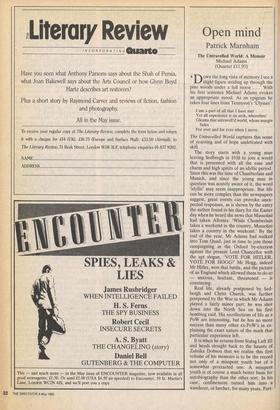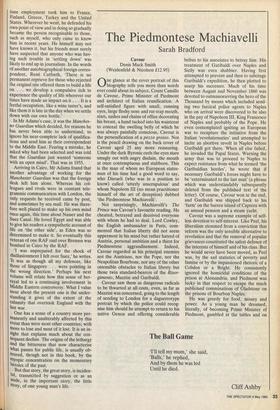Open mind
Patrick Marnham
The Untravelled World: A Memoir Michael Adams (Quartet £11.95) -r-1 own the long vista of memory I see a I—, slight figure striding up through the pine woods under a full moon . . .' With his first sentence Michael Adams evokes an appropriate mood. As an epigram he takes four lines from Tennyson's 'Ulysses':
I am a part of all that I have met Yet all experience is an arch, wherethro' Gleams that untravell'd world, whose margin fades For ever and for ever when I move.
The Untravelled World captures this sense of yearning and of hope undefeated with skill.
The story starts with a young man leaving Sedbergh in 1938 to join a world that is presented with all the ease and charm and high spirits of an idyllic period. Since this was the time of Chamberlain and Munich, and since the young man in question was acutely aware of it, the word `idyllic' may seem inappropriate. But life can be more complex than the newspapers suggest, great events can provoke unex- pected responses, as is shown by the entry the author found in his diary for the Easter day when he heard the news that Mussolini had taken Albania: `While Chamberlain takes a weekend in the country, Mussolini takes a country in the weekend.' By the end of the year, Mr Adams had walked into Tom Quad, just in time to join those campaigning in the Oxford by-election against the present Lord Chancellor with the apt slogan, 'VOTE FOR HITLER, VOTE FOR HOGG!' Mr Hogg, indeed Mr Hitler, won that battle, and the picture of an England which allowed them to do so — anxious, hesitant, threatened — is convincing.
Real life, already postponed by Sed- bergh and Christ Church, was further postponed by the War in which Mr Adams played a fairly minor part; he was shot down into the North Sea on his first bombing raid. His recollections of life as a PoW are interesting, but he has no more success than many other ex-PoW's in ex- plaining the exact nature of the mark that particular experience left.
It is when he returns from Stalag Luft III and heads straight back to the haunts of
Zuleika Dobson that we realise this first volume of his memoirs is to be the record not only of a misspent youth but of a somewhat protracted one. A misspent youth is of course a much better basis for autobiography than the other sort. In his case, confinement turned him into a wanderer, or lurcher, for many years. Part- time employment took him to France, Finland, Greece, Turkey and the United States. Wherever he went, he defended his own point of view and in doing so gradually became the person recognisable to those, such as myself, who only came to know him in recent years. He himself may not have known it, but his friends must surely have suspected that anyone who was hav- ing such trouble in 'settling down' was likely to end up in journalism. In the words of another autobiographical foreign corres- pondent, Rene Cutforth, 'There is no permanent reprieve for those who rejected the original site offered them to build a life on . . . we develop a compulsive itch to experience the quality of life wherever our times have made an impact on it . . . It is a fretful occupation, like a wine taster's, and like them it is late in the day when we settle down with our own bottle.'
In Mr Adams's case, it was the Manches- ter Guardian which decided, for reasons he has never been able to understand, to Ignore his near-complete lack of qualifica- tions and send him as their correspondent to the Middle East. Fearing a mistake, he asked why had been selected and was told that the Guardian just wanted 'someone With an open mind'. That was in 1955.
Arriving in Cairo, Mr Adams found that another advantage of working for the Manchester Guardian was that the foreign desk left him alone. Whereas his col- leagues and rivals were in constant tele- grammic communication with London, the only requests he received came by post, and sometimes by sea mail. He was there- fore well placed to make up his own mind once again, this time about Nasser and the Suez Canal. He loved Egypt and was able to give his readers a sympathetic account of life on 'the other side', as Eden was so determined to make it. So eventually this veteran of one RAF raid over Bremen was bombed in Cairo by the RAF.
'I was unprepared for the shock of disillusionment I felt over Suez,' he writes. 'It was as though all my defences, like those of Singapore . . . were pointing in the wrong direction.' Perhaps his next Volume will relate how this sense of bet- rayal led to a continuing involvement in Middle Eastern controversy. What I value most about the present one is the under- standing it gives of the extent of the calamity that overtook England with the last war.
One has a sense of a country more per- manently and unalterably affected by this event than were most other countries; with More to lose and most of it lost. It is an in- sight that explains much about the con.
Sequent decline. The origins of the lethargy and the bitterness that now characterise What passes for public life, is usually ob- scured, though not in this book, by the myopic concentration on the momentary heroics of the past. But that story, the great story, is inciden- tal, transmitted by suggestion or as an aside, in the important story, the little story, of one young man's life.



















































 Previous page
Previous page